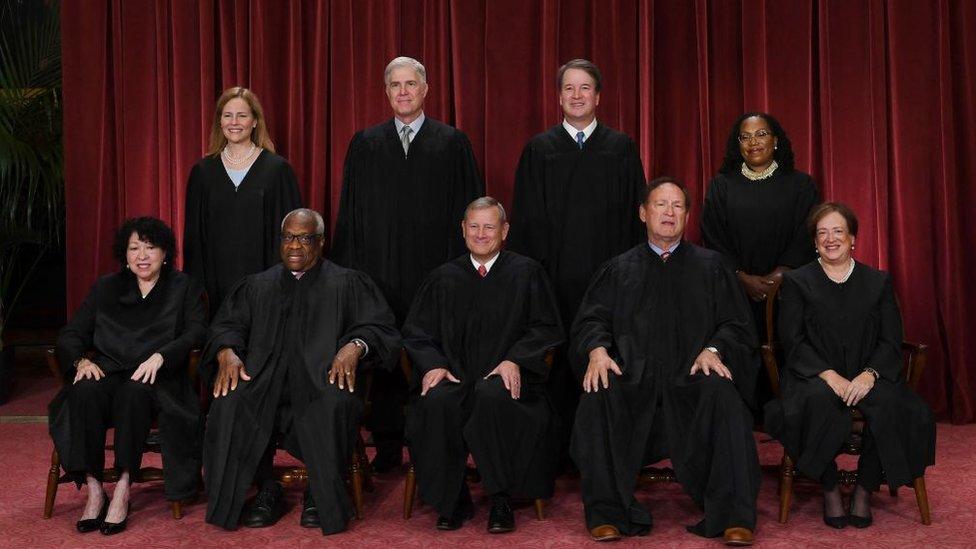Supreme Court fight ahead as Obama 'plays it straight'
- Published
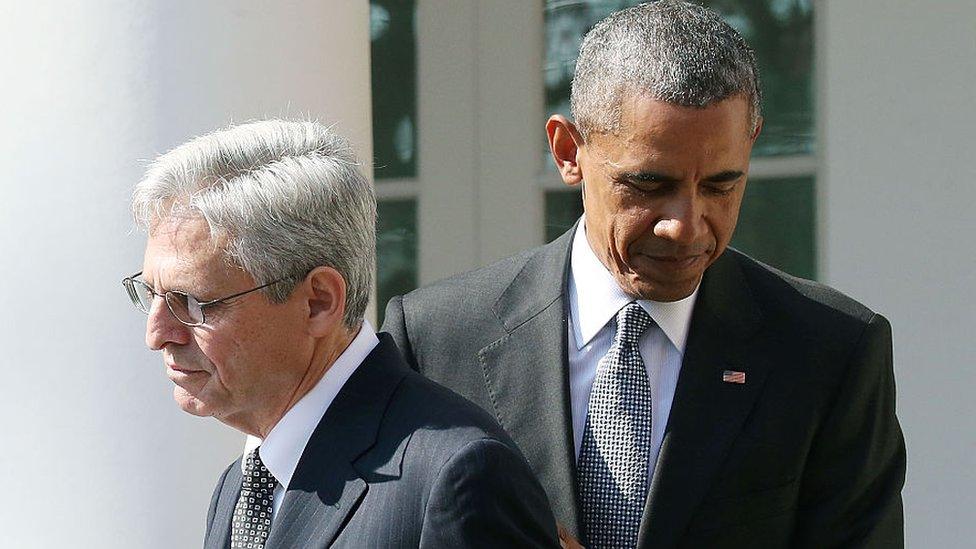
While introducing his nominee to fill the vacancy on the Supreme Court after Justice Antonin Scalia's death, President Barack Obama said he wanted to "play it straight".
There had been suggestions that he would take the opportunity to advance a full-spectrum liberal for the court, or a minority or woman who would appeal to a key voting bloc in the coming presidential election.
Such a move, however, isn't Mr Obama's style. Instead Mr Obama opted for Merrick Garland - a moderate jurist who had enjoyed bipartisan support when he was confirmed to a lower court in 1997.
It was a safe pick - the kind of pick that in the past, removed from shadow of a presidential election, likely would have been easily confirmed by the US Senate.
This pick allowed Mr Obama to engage in one of his favourite pastimes of late - assuming a professorial tone and lecturing the nation on the dangers of partisanship and political vitriol run amok.
"It is tempting to make this confirmation process simply an extension of our divided politics, the squabbling that's going on in the news every day," Mr Obama said.
"But to go down that path would be wrong. It would be a betrayal of our best traditions and a betrayal of the vision of our founding documents."
If Mr Obama's goal was to take the high road, however, it seems quite likely he'll be travelling it largely alone.

More on the US Supreme Court
The political battle for the Supreme Court
Who is Merrick Garland? - Tough on crime, he prosecuted Oklahoma City bomber Timothy McVeigh
Meet the current Justices - The current slate is evenly spilt between conservatives and liberals

Republicans in the Senate have already said they won't even hold hearings to consider Mr Garland's nomination.
"In light of the contentious presidential election already well under way, my colleagues and I on the judiciary committee have already given our advice and consent on this issue - we will not have any hearings or votes on President Obama's pick," Utah Senator Mike Lee said when news of the nomination spread on Wednesday morning.
Missouri Senator Roy Blunt said, bluntly: "I will not vote for this nominee to the Supreme Court."
Mr Obama's political opponents are going beyond simply asserting that they shouldn't confirm any nominee advanced by the president during an election year, however. Garland's judicial record is already being picked over by conservative activists and interest groups just hours after his name was announced.
Carrie Severino of the Judicial Crisis Network identified, external the area in Garland's 18-year record on the appellate court that has attracted the most conservative opprobrium - gun control.
The judge supported reconsideration of a landmark lower-court decision on gun rights, District of Columbia v Heller, that was eventually affirmed by a narrow Supreme Court majority (in an opinion written by the late Justice Antonin Scalia).
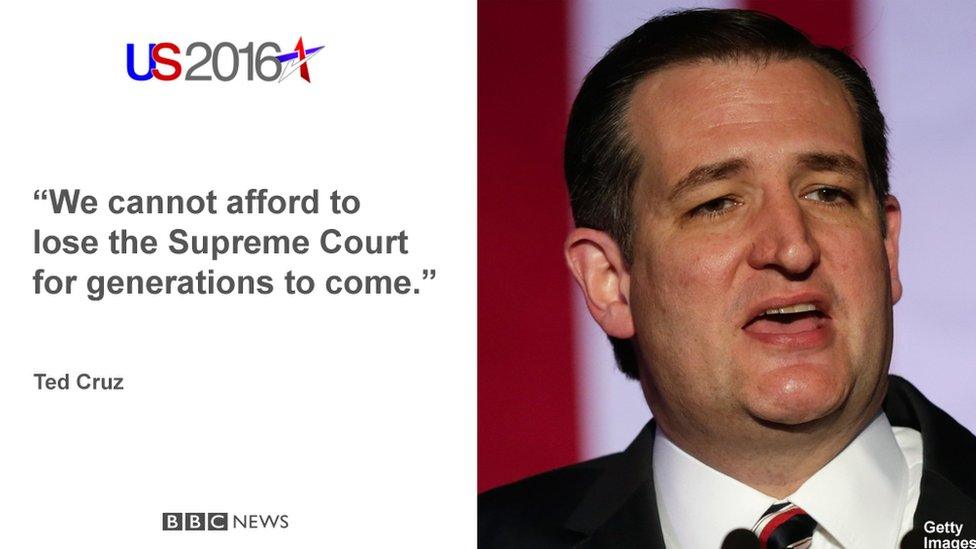
She also cited a case in which Garland had upheld the legality of a government policy during the Clinton administration of preserving gun-purchase records for six months - a programme conservatives labelled an illegal firearm registry.
Texas Senator Ted Cruz fired off a statement alleging that Mr Garland would vote in lockstep with his fellow liberals on the court - although, tellingly, the presidential candidate quickly pivoted to criticising his Republican opponent, Donald Trump.
"If Garland were confirmed, he would side predictably with President Obama on critical issues such as undermining the Second Amendment, legalising partial-birth abortion and propping up overreaching bureaucratic agencies like the EPA and the IRS," he wrote.
"We cannot afford to lose the Supreme Court for generations to come by nominating or confirming someone that a dealmaker like Donald Trump would support."
Despite the widespread opposition to Garland's nomination among conservatives, however, there has been evidence of some cracks in the resistance.
A number of Republican senators in Democratic-leaning states are up for re-election in November, and while no one has come out and said they'd support confirmation, several have expressed willingness to meet with the nominee - a Senate tradition that appears to have been suspended by many hard line conservatives this time around.
"He's a current appeals court judge and out of courtesy and respect we will certainly meet with him if he would like to meet with me," Senator Kelly Ayotte of New Hampshire told Politico, external.
Sitting down with Mr Garland is a far cry from supporting him, however. And it will take at least 13 Republicans to join with all the Democrats in the Senate in backing Mr Garland to break an expected Republican procedural block on the nomination should it eventually go before full Senate.
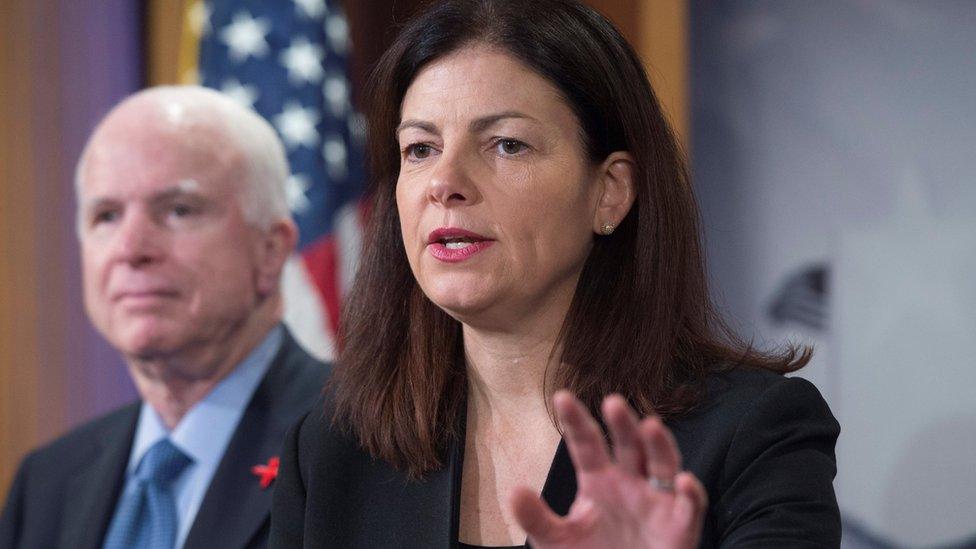
New Hampshire Republican Kelly Ayotte has said she will meet Mr Garland, but no Republican senator opposed leadership and called for hearings
On the other side of the aisle, some liberals are less than enthusiastic about what they see as an uninspiring choice by Mr Obama.
"Garland's 'moderation' seems to be an affinity with the left on government power to regulate and the right on government power to police/incarcerate," tweets Washington Post columnist Radley Balko, citing the judge's history of supporting police positions in search-and-seizure cases.
"It's just a boring, status quo, baffling pick from a president who allegedly wants criminal justice reform to be part of his legacy."
Slate's Mark Joseph Stern called the Garland pick "extremely disappointing", given the president's opportunity to increase the diversity on the court.
"Had Obama nominated a less historically conventional candidate, he could have simultaneously proved that he understands the necessity of empathetic, unorthodox voices on the bench - while also giving the Democratic base a new kind of champion to rally around," he wrote.
"Instead, Obama is asking Americans to cheer for yet another white guy."
An angry Republican conservative resistance and signs of an ambivalent left that was hoping for more aren't exactly the ingredients of a successful nomination battle - but it's the field on which this fight will play out.
Merrick Garland: 'Greatest honour of my life'
Meanwhile the presidential candidates from both parties are sure to point to the impasse as all the more reason why their voters need to turn out at the polls in November, given that the ideological shape of the court for a generation is possibly at stake.
With their opposition, Republicans are hoping a newly elected conservative president will name a nominee more like the departed Scalia. It's a dangerous game, however, given that a Democratic president like Hillary Clinton would likely pick a candidate decidedly to the left (and likely much younger) than Mr Garland who is 63.
Even a President Trump could be a wildcard, since he would take office on the back of support from well outside the party establishment.
There's even talk among some Senate Republicans that in the event of a Democratic win in November, they would move to quickly confirm Mr Garland in a December session before the new president is sworn in.
Such a manoeuvre would open them to criticism of their assertion that the voters should decide the shape of the Supreme Court as nothing but empty rhetoric, however.
During his short remarks after being nominated, Mr Garland thanked the president and noted that he would be faithful to the Constitution and the laws of the nation "if the Senate sees fit to confirm me to the position for which I have been nominated today".
Usually that's a throwaway line; a bit of humility as the judicial confirmation process grinds into motion.
That's definitely not the case this time around.
- Published16 March 2016
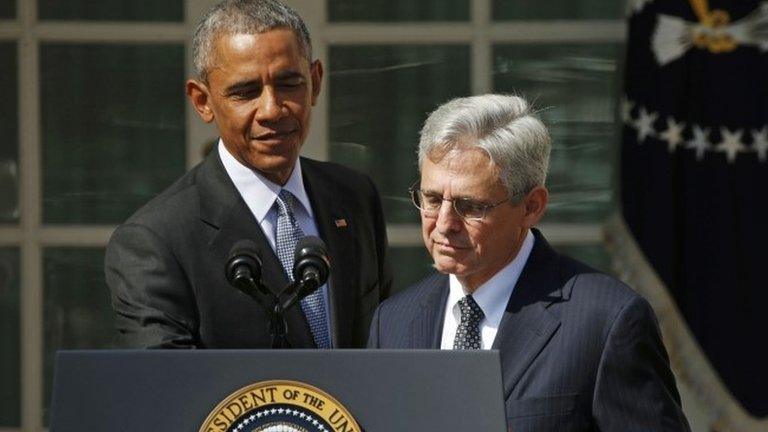
- Published16 March 2016
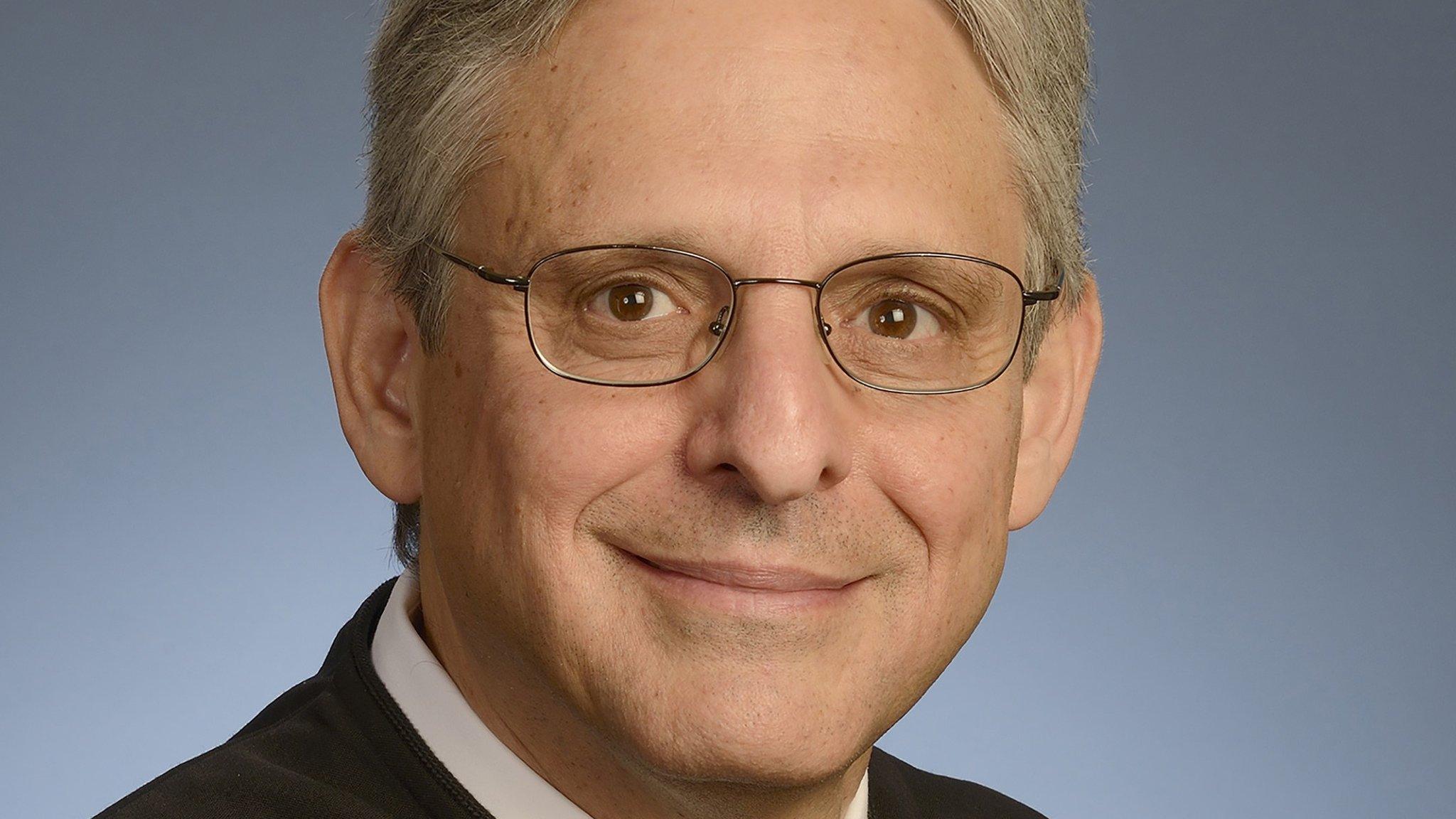
- Published16 February 2016
- Published8 February 2024
